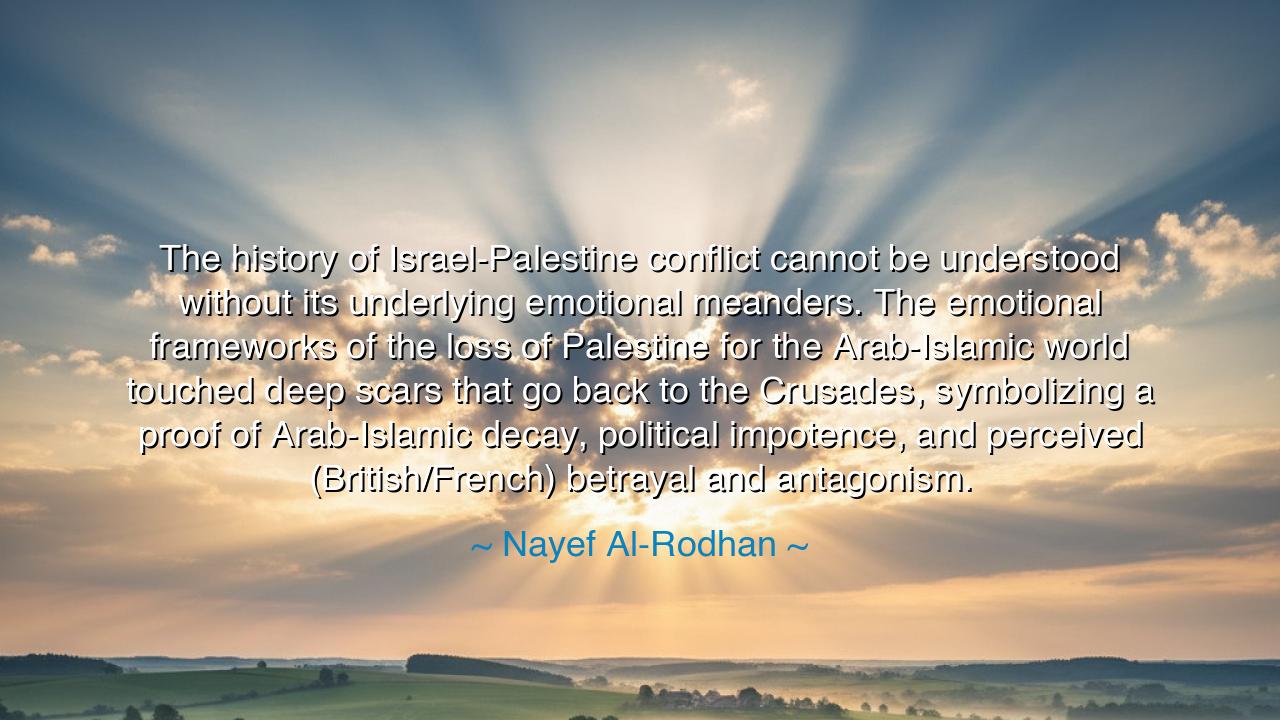
The history of Israel-Palestine conflict cannot be understood
The history of Israel-Palestine conflict cannot be understood without its underlying emotional meanders. The emotional frameworks of the loss of Palestine for the Arab-Islamic world touched deep scars that go back to the Crusades, symbolizing a proof of Arab-Islamic decay, political impotence, and perceived (British/French) betrayal and antagonism.






Hearken, O children of reflection and seekers of understanding, and attend the words of Nayef Al-Rodhan, who spoke with the solemnity of one who contemplates the currents of history and the weight of human emotion: “The history of Israel-Palestine conflict cannot be understood without its underlying emotional meanders. The emotional frameworks of the loss of Palestine for the Arab-Islamic world touched deep scars that go back to the Crusades, symbolizing a proof of Arab-Islamic decay, political impotence, and perceived (British/French) betrayal and antagonism.” In these words lies a meditation upon the intertwining of emotion, history, and perception, reminding us that conflicts are rarely born solely of politics—they are nourished by the wounds and memories of generations.
Al-Rodhan teaches that to understand the Israel-Palestine conflict, one must peer beyond treaties, borders, and armies, and recognize the deep emotional currents that shape perception and action. The loss of Palestine resonates not only as a territorial dispute, but as a symbol of historical decline, betrayal, and unfulfilled destiny for the Arab-Islamic world. It evokes memories of centuries past, when foreign powers encroached, and the promise of sovereignty seemed ever elusive. The past, he reminds us, is alive in the hearts of men.
Consider the echoes of the Crusades, when European armies marched upon the lands of the Levant. The capture of Jerusalem, the desecration of sacred sites, and the prolonged occupation left emotional scars that were not easily healed. These memories became woven into cultural and religious consciousness, and centuries later, the loss of Palestine in the twentieth century reawakened these historical wounds, shaping attitudes, expectations, and responses to the modern political reality. History, therefore, is not merely chronology—it is the vessel of collective feeling.
The sense of betrayal that Al-Rodhan highlights is exemplified by the actions of Britain and France during and after World War I. Promises made in the McMahon-Hussein Correspondence contrasted sharply with the Sykes-Picot Agreement and the Balfour Declaration. Arab leaders felt deceived, their aspirations for independence frustrated by foreign manipulation. This perceived antagonism fanned the flames of mistrust and resentment, showing how political decisions, filtered through emotional frameworks, can have consequences that endure across generations.
The lesson embedded in Al-Rodhan’s words is that emotions, grievances, and historical memory shape the way peoples respond to modern crises. Conflict is not only a matter of territory or policy—it is the expression of psychological and emotional legacies. The Israel-Palestine dispute, therefore, cannot be resolved without acknowledging these layers, recognizing the depth of historical trauma, and understanding how perceptions of betrayal and decay influence action.
Consider also the Palestinian Nakba of 1948, when hundreds of thousands were displaced. For the Arab-Islamic world, this event was not merely a loss of land, but a profound validation of fears of decline, impotence, and betrayal—a contemporary echo of historical defeats and unhealed wounds. Such events demonstrate how emotion entwines with history, giving meaning to political struggles, shaping national identity, and influencing generations’ responses to injustice.
From this reflection emerges practical guidance: in understanding conflicts, study both the historical record and the emotional narratives that flow through societies. Listen to the stories of those who have endured displacement, betrayal, or humiliation. Engage with history empathetically, recognizing that grievances are often magnified by centuries of memory. Only by acknowledging both fact and feeling can solutions be imagined that address not just land or power, but the human heart.
Thus, remember: history is not merely a ledger of events, but a tapestry woven with emotion, memory, and perception. Nayef Al-Rodhan teaches that the Israel-Palestine conflict is inseparable from centuries of wounds, betrayals, and perceived decline. To understand, to empathize, and to seek resolution, one must navigate these emotional meanders with wisdom, patience, and humility. The past shapes the present not only in deeds but in feeling, and understanding both is the path to enduring insight.
If you wish, I can also craft a more dramatic, audio-ready version, vividly tracing the Crusades, the McMahon-Hussein Correspondence, and the Nakba, making Al-Rodhan’s analysis of emotional and historical layers resonate deeply for listeners. Do you want me to do that next?






AAdministratorAdministrator
Welcome, honored guests. Please leave a comment, we will respond soon